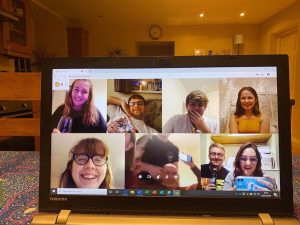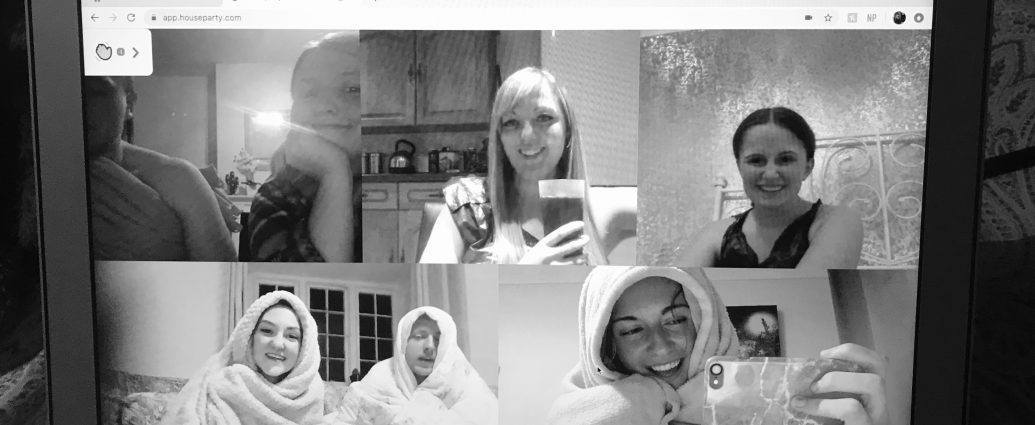Jittering audio comes out of my laptop as someone plays music from their speaker, a few friends are dancing, one has their face frozen and a couple of others are attempting to find a comedic Zoom background. They haven’t yet noticed I’ve joined.
“How is everyone doing?” I ask as I finally connect my webcam and microphone for my second group quiz of the week. My face pops up on the screen and I notice how messy my hair is and how flushed my makeup-free face looks on camera. “Yeah… not bad,” a couple mutter after an initial silence, no-one knowing who should speak first. What else is there to say? No updates of our days other than the copious amounts of revision we should be doing but aren’t.
We’re all at different levels of tipsy, some had a couple of drinks before they joined and others have run out of alcohol and are quietly sat without a drink in hand. It’s chaotic.
With so many platforms to keep seeing our loved ones faces, it would seem ignorant to say ‘no’ to a video call, wouldn’t it? There’s no excuse when you’re at home with nothing else to do.
For myself, after a long day attempting to produce work, calling with lecturers and staring at various screens from the moment I woke up, I’m worn out before I even join in on this evening of virtual socialising.



“I think it’s video quizzes that have got me run down. As soon as you say ‘sorry I can’t tonight’ you have to give a million reasons why and you end up feeling guilty so end up doing it.”
Russell Mountford, Manchester
According to an ‘unofficial social experiment’ by National Geographic, this exhaustion as a result of hours on video chat isn’t uncommon, gaining the new slang name of ‘Zoom fatigue.’ With no way to excuse our exits from group calls, a lot of us are left prolonging a call for longer than it has to be and sit listening to other peoples conversations unable to get a word in ourselves.
“For some people, the prolonged split in attention creates a perplexing sense of being drained while having accomplished nothing.”
National Geographic Study
It’s no myth that overuse of technology is incredibly draining. Being subconsciously drawn to seeing our faces on screen and becoming increasingly obsessive over our own appearances doesn’t help this anxiety.
“I find video calls absolutely exhausting. You never know where to look and I become fixated on how awful my hair is. The lack of any real interactions means you end up working so much harder than you would in a normal conversation.”
Hayley Thomas, London
Although it’s clear video calls have their place in isolation, it’s hard to ignore that as we become overly aware of the way we look on camera and attempt to keep up with the disorganised conversations, sometimes we come away from these calls feeling mentally exhausted and ready for bed.
How can we make video-calling less draining?
- Advice that has been given to me is to remove my own face from the screen, whether I can do that manually or to cover my face with a sticky note. Focusing less on our own appearances will allow us to focus more on other peoples non-verbal cues as much as we can, making it more similar to an ordinary conversation. After all, we wouldn’t spend the whole time looking at ourselves in real life!
- Secondly, I think it’s so important to know, like any social interaction, it’s ok to say no if we’re not feeling up to it. Perhaps, limit the amount of calls we have per week or if we’re not prepared for a group call, call somebody one-on-one instead for a more personal ‘chit-chat’.
- Finally a tip that I’ve taken from a BBC article is how important it is to get away from technology when we can. In lockdown it’s so easy to go on our phones as soon as we wake up and continue using phones and laptops for the entirety of the day, which not only is tiring for our eyes but for our brains.
“Building transition periods in between video meetings can also help refresh us – try stretching, having a drink or doing a bit of exercise, our experts say.”
At the end of the day, although the pressure to group call and turn our cameras on is overwhelming, finding ways to make these calls more enjoyable will overall make us feel less anxious when someone suggests a group chat. It’s just something we all have to learn to love together.
Megan Price
Featured image courtesy of Megan Price. This image has in no way been altered.

